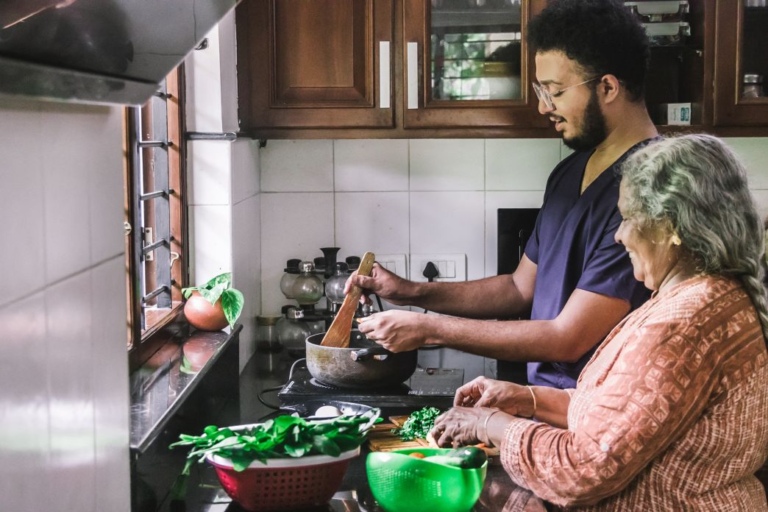Supporting Next of Kin
When a family member or a close friend has lost their loved one, it can be hard to know how best to support them as they go through this difficult time.
Simply start by letting them know you are there for them. You could offer practical support, such as helping with household chores or running simple errands or could just sit and listen for as long as they need to allow them to express their feelings without judgement or interruption. It’s important to check in with them regularly as grief can be a long and difficult process. Above all, be patient and understanding, and let your loved one know that they are not alone.
You don’t need perfect words. Being there, staying present, and not disappearing are often the most powerful ways to support someone after a loss.
Ways to support a grieving friend
Here are some practical ways you could help during this difficult time:
– Drive the next of kin and let them relax as much as possible.
– Keep children occupied.
– Cook a meal or two.
– Help around the house – don’t ask, just pitch in.
– Don’t be afraid to ask others for help and give tasks to others.
– Pick up relatives from the airport.
Continue support after the funeral. When everyone that visited for the service goes back to their “normal” lives, it can be a very tough time for the next of kin. Make sure you keep in touch and spend some quality time together. You could drop off some chocolates, or even just send a message letting them know that you’re thinking of them.

Helping to plan a funeral
The person closest to the person who has passed away might want to be part of every single detail of the funeral planning process if it helps to ease their grief. Alternatively, they might find this experience too overwhelming and want to take a step back.
This can provide an opportunity for you to be able to help in a more practical way, by taking care of making smaller decisions and running errands to prepare for the service, while keeping the next of kin in the loop and in charge of making the big decisions.
When someone is in the midst of grief, it can be hard to make decisions and remember details. Be patient, and take notes.
Make sure you understand the important details of what the next of kin would like and get a general idea of budget. Find a time to sit down with them and ask them what they want.
If there are many people who would like to help plan the funeral, make sure that you have one person to talk directly with the funeral director. If you are using a funeral director, it is important for the next of kin to let them know who can act on their behalf. You might notify people on behalf of the next of kin or help write the obituary.

Frequently Asked Questions
When you’re attending a funeral or service, it’s hard sometimes to know what to say to those dealing with the death of a loved one. Finding the right words doesn’t come easy to most people, and we worry about saying the wrong thing so oftentimes we find ourselves tiptoeing around the subject.
However, it’s so important to show your love and support to those dealing with the death of a loved one and small words of kindness and comfort can really help them feel less alone in their grief.
Understanding more about grief can help you better support your friend or loved one during their loss journey. Browse through our resources to support those who are grieving.
You could suggest grief counselling or support groups if they seem overwhelmed or isolated or help them find local or culturally appropriate support services. Encourage rest and self-care without pressure
Tips on offering condolences
A few words to the effect of “I’m so sorry for your loss,” or “My thoughts are with you during this difficult time” can really help to show your love and support, and if it’s appropriate, a hug can also speak more than words. Keep your words brief and to the point. Loved ones might already be overwhelmed with grief and listening might not be their priority at the moment. Listen to what they say, if they say anything, but avoid speaking yourself for too long.
Sharing memories & stories
Sharing a memory or story about the deceased can be a comforting way to celebrate their life and create an uplifting atmosphere.
Offering your help
If you’re close to family and friends of the person who has died, you might want to offer your help in a practical way. You could say something like, “I’m here for you if you need someone to talk to.” Someone who is experiencing loss might avoid asking for help as they don’t want to burden anyone, so reach out.
Be respectful and consider cultural differences
It is important to be respectful and mindful of the occasion when speaking at a funeral. Avoid making jokes or speaking in a lighthearted way, as this can be seen as disrespectful. Instead, speak in a calm and measured tone, and avoid bringing up any contentious topics.
New Zealand Aotearoa is a diverse country and so it’s important to be aware of cultural differences throughout the funeral. Some cultures might have specific customs or rituals that will need to be observed. It’s important to respect these traditions.
